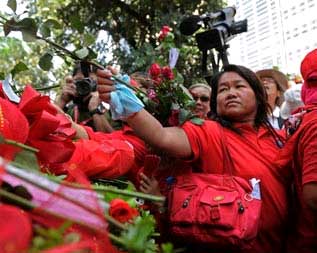Thousands of anti-government protesters massed in the Thai capital Sunday for the latest in a series of rallies by rival political factions ahead of elections expected this year.
An estimated 15,000 "Red Shirts" -- the movement behind mass demonstrations in Bangkok last year -- gathered near Democracy Monument amid a heavy security presence, national police spokesman Prawut Thavornsiri said.
He said 5,000 police were deployed for the event, which fugitive former premier Thaksin Shinawatra addressed in a phone-in from an undisclosed location.

Thai anti-government 'Red Shirts' protesters place flowers on a wall outside the criminal court to demand the release of their nine detained leaders during a rally in Bangkok.
Thaksin remains a controversial figure in Thailand. He draws support among the mainly poor and working class Red Shirts but is loathed by the urban elite, who see him as corrupt, authoritarian and a threat to the revered monarchy.
"We don't want anything but peace and hope the country returns to normal," said the tycoon-turned-premier, who lives overseas -- mostly in Dubai -- to avoid a jail sentence for corruption imposed in absentia.
"We want free and fair elections. We want to see an elected government," he told the red-clad crowd. "I believe an election will be held but not soon because they (the current government) benefit from corruption."
Thaksin again brushed aside rumours that his health is ailing.
Mass protests in April and May of last year by the Red Shirts left 90 people dead in a series of street clashes between demonstrators and the army, which broke up the demonstration.
Red Shirt supporters on Sunday laid red roses in front of Bangkok's Criminal Court where a letter from detained leaders was read out.
Rival "Yellow Shirt" nationalist activists meanwhile have been rallying recently near Government House calling for Prime Minister Abhisit Vejjajiva to step down over his handling of a deadly border dispute with Cambodia.
The "Yellow Shirts" were once allies of the establishment-backed Abhisit, but relations have soured recently and the movement's political party has emerged as a rival force to the ruling Democrats.
Abhisit said last week he would call a general election in the first half of this year if there was no fresh political violence.
The government recently invoked the Internal Security Act in Bangkok to cope with the renewed political rallies.
AFP/ac


























